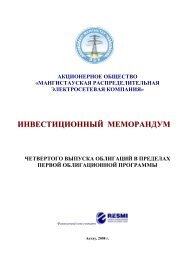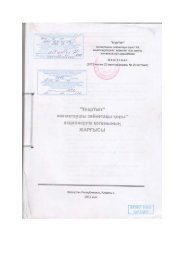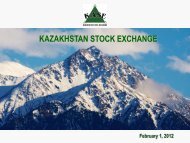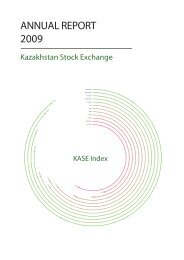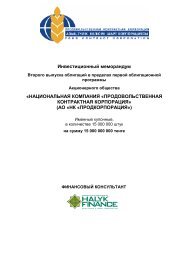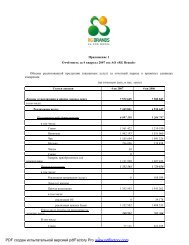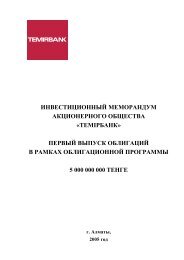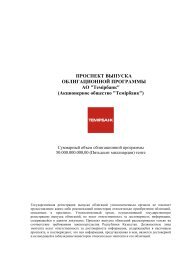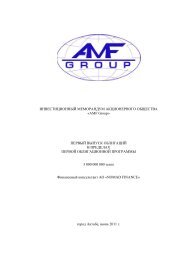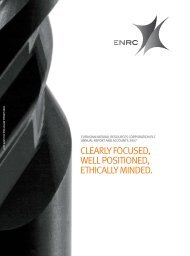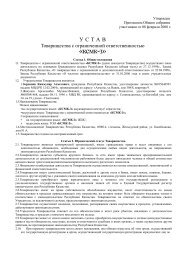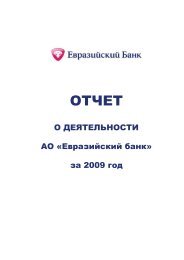JPMorgan - KASE
JPMorgan - KASE
JPMorgan - KASE
Create successful ePaper yourself
Turn your PDF publications into a flip-book with our unique Google optimized e-Paper software.
of state of the members of this economic zone, it was decided to admit Tajikistan to full<br />
membership. In addition, a treaty on the development of security markets was signed by the<br />
member states and the Government and the executive committee of the interstate council of<br />
Kazakhstan, The Kyrgyz Republic and Uzbekistan concluded an agreement to promote and<br />
monitor economic relations among these three countries.<br />
Kazakhstan has maintained significant political and economic relations with Russia since gaining<br />
independence from the Soviet Union. After the dissolution of the Soviet Union, Kazakhstan<br />
concluded a so-called zero option agreement with Russia which provided for Russia’s acceptance<br />
of responsibility for virtually all external debt liabilities contracted on behalf of the former Soviet<br />
Union, in return for Kazakhstan waiving all claims on former Soviet Union assets located outside<br />
the territory of Kazakhstan.<br />
In May 1997, Kazakhstan, Russia and Oman (together with other oil producers) signed the<br />
Caspian Pipeline Consortium (the “CPC” or the “Consortium”) agreement for the construction of<br />
a pipeline linking the Tengiz oil field in the western part of Kazakhstan with the Black Sea port<br />
of Novorossiisk in Russia. Successful completion of the project is expected to increase<br />
substantially Kazakhstan’s ability to take advantage of its oil reserves and to attract foreign<br />
investment. Work on the pipeline began in January 1999. The first phase was completed and it is<br />
believed it will become fully operational by the end of second quarter 2003.<br />
Kazakhstan and Russia have reached agreement regarding the division of mineral rights in the<br />
Kazakhstan-Russian part of the Caspian basin on a sectoral basis. It was also agreed that these<br />
rights in the basin, which is estimated to contain significant liquid hydrocarbon deposits, would<br />
be exploited by Kazakhstan and Russia on a broadly simultaneous basis. In October 2000, the<br />
Presidents of Russia and Kazakhstan signed a declaration of co-operation in this regard. In May<br />
2002, Kazakhstan and Russia agreed on the exact position of a separation line between the two<br />
countries relating to subsurface usage rights and also on the development of three major oil and<br />
gas deposits situated off the Russian and Kazakhstani coasts in the Caspian Basin. The<br />
Government hopes to reach agreement on similar sectoral divisions with the other littoral states<br />
but the absence of such agreements is not anticipated to delay exploitation in the Kazakhstani or<br />
Russian sectors. Test drilling in both sectors started in August 1999. See “ – Natural Resources –<br />
Oil and Gas”. In addition, both countries have reached agreement relating to the long-term use<br />
by Kazakhstan of the Russian oil pipeline network.<br />
Space exploration began in 1957 when the first satellite was launched by the former Soviet Union<br />
from the Baikonur Space Center located in south-western Kazakhstan. In 1994, Kazakhstan<br />
concluded a series of agreements with Russia (the “Baikonur Agreements”) on the future use of<br />
the Baikonur Space Center. Under the Baikonur Agreements, the Government has leased the<br />
facilities to Russia for 20 years (with an option to extend the agreement for an additional 10<br />
years) in return for the payment of annual rent of U.S.$115 million.<br />
Kazakhstan and Russia recognize the necessity of regulating mutual financial obligations in<br />
accordance with bilateral agreements, treaties and protocols. Thus, pursuant to an agreement<br />
made in October 1998 between Kazakhstan and Russia, mutual financial obligations amounting<br />
to almost U.S.$1.7 billion, which included unpaid rent under the Baikonur Agreement, were<br />
cancelled in full.<br />
At the end of 1998, Kazakhstan and Russia agreed to a temporary ban on the export to<br />
Kazakhstan of food items from Russia. The ban came into effect on 11 January 1999 and expired<br />
on 23 June 1999. Currently, there is a temporary ban on the export of zinc-plated sheets to<br />
Russia.<br />
In 2001 Kazakhstan adopted a number of resolutions temporarily prohibiting the export of<br />
specific goods or establishing anti-dumping fees for specific goods imported from neighboring<br />
countries, including Russia.<br />
B-6




